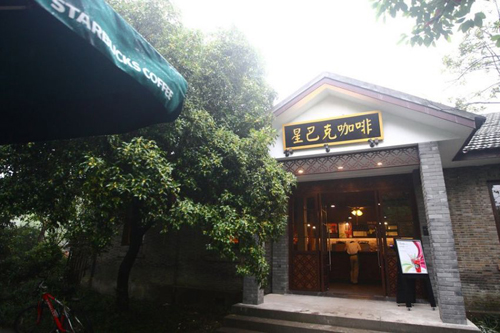Buddhist Starbucks stirs controversy
 0 Comment(s)
0 Comment(s) Print
Print E-mail Shanghai Daily, September 24, 2012
E-mail Shanghai Daily, September 24, 2012
 |
|
A coffee shop near one of Buddhism's most famous temples in China has sparked a heated debate about a clash of cultures. |
A coffee shop near one of Buddhism's most famous temples in China has sparked a heated debate about a clash of cultures.
Starbucks' newly opened outlet close to Hangzhou's Lingyin Temple, has been called a second "cultural invasion," with critics saying the US chain's commercial style will spoil the serenity that an oriental Buddhism temple should embrace.
Supporters, however, said they welcomed the outlet as a place for tourists to enjoy a drink after visiting the temple.
Talk of an "invasion" was misplaced, they said, as the outlet was not inside the temple but on a nearby commercial street where a KFC restaurant and a shopping mall had been open for more than six months.
The incident follows calls in 2009 to stop the first "cultural invasion" when the Seattle-based coffee chain had to move its outlet out of Beijing's Forbidden City seven years after it opened.
Critics had urged the closure of the outlet which they said was a "humiliation" for a culture exemplified by the ancient buildings.
On Friday, Starbucks announced on its official Weibo microblog that its Lingyin Temple branch would be opening the next day.
Critics were quick to respond.
"Must the ancient Chinese culture give way to the Western and commercial atmosphere? Starbucks should try open branch in London's Big Ben," said Zhixiang.
"So today we can allow having a Western coffee shop near the Buddhism temple, then why can't we have a massage house or a sex toy shop nearby tomorrow?" was another microblog comment.
"Several years ago Starbucks was driven out of the imperial palace, and now it had to turn to monks," another mocked.
But supporters fought back, with many of them saying that it was not the coffee shop that had affected the temple's atmosphere as the commercial street with Western restaurants and shopping malls had been there for half a year.
"Why do we have to keep pretending to ignore the fact that the Lingyin Temple area have already fallen into pure commercial atmosphere when the local government started to set up the small businesses?" asked Deng Haijian.
Deng and some other posters said they were calling on local governments to make a start to protecting Chinese culture at major scenic spots by wiping out all small enterprises, both Chinese and foreign shops.






Go to Forum >>0 Comment(s)